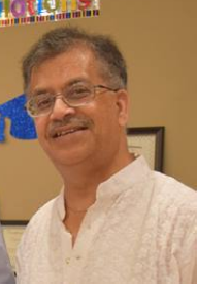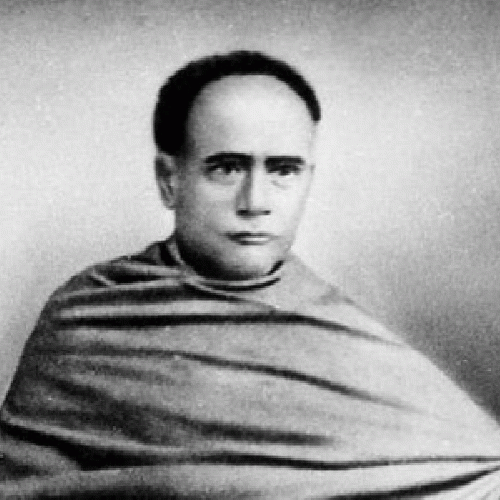Vidyasagar and the Emergent Bengal Renaissance:
Canons of Character from Shambhu Chandra Vidyaratna's Vidyasagar Jeevan-Charit O Bhramaniras
Selected excerpts translated by Monish R Chatterjee  �2021
Part II
(This is part II of a 2-part article on one of the leading figures of the 19th-century Bengal renaissance- the scholar, educationist, humanitarian and social reformer, Ishwar Chandra Vidyasagar. The translations presented here, and possible future installments are episodic excerpts extracted from the biographical text in Bengali by ICV's 3rd younger brother, Shambhu Chandra Vidyaratna. The excerpts presented herein, as in Part I, highlight ICV's significant interactions with leading English administrators, from school and college levels all the way to Lieutenant Governors and even the Governor General of the British East India Company. These highlight his emergence as one of the founders of modern Indian education, in particular the education of women. MRC)
[Excerpted from Chakuri- sketches from his years in service]
". In the year 1847, (following the advice of the Principal of Fort William College, Mr. Marshall) Agraja published the Bengali translation of Vetal Panchavingshati from Hindi. Per understanding, the Principal of Fort William College deposited 100 copies of the book to the college library to be perused by the civilians; the government paid 300 rupees for the same. This sum covered the printing cost. Of the remaining 400 copies, Agraja [venerable older brother, an Indian mode of address- MRC] donated 200 to friends and family members. A book of such quality had never before been published in Bengali. As a result, Agraja received much praise at home and abroad. Via Vetal Panchavingshati alone, Agraja gained great renown throughout Bengal. People from all social strata expressed great eagerness to read the Bengali Vetal Panchavingshati since it had poetic structure of a very high order. Students at Sanskrit college and other educational institutions would learn Bengali writing skills by studying the Bengali Vetal Panchavingshati. It must be acknowledged by all that Vidyasagar was the pioneer in the education of students in the Bengali language. He was also the Guru in the matter of ushering in the modern Bengali language writing and teaching. "..
[Excerpted from Chakuri- sketches from his years in service]
". Even from his childhood, Agraja would often wonder why it was that women and girls were not allowed to receive any education. Why in fact were they denied access to gaining knowledge their entire lives? Likewise, how could one make it possible to eliminate the evil polygamy practiced by the Kulin Brahmins (an orthodox group within the Brahmin ranks which practiced intermarriage and of course in many cases, polygamy, sometimes with child brides)? According to him, as he became more well-informed, this was very much against the shastras (Hindu moral codebooks); as long as such evil practices were not eliminated from this land, there would be nothing but misery for the Hindus of Bengal.
When a child bride would encounter widowhood (often a consequence of a much older man marrying a girl child- MRC), he would become deeply aggrieved. One day, when the twelve-year-old daughter of a relative became widowed, Mother (ICV's) became utterly distraught and began weeping. When Agraja attempted to console her, both Mother and Pitri-Deva (venerable Father) earnestly posed the question (to ICV)- "Is there no provision made in the Dharma Shastras for the remarriage of child widows? Were the law-makers truly this heartless?" These heart-rending words from his parents became etched in his heart.
That same year, Agraja was appointed Examiner for Bengali writing by senior students from Hindu, Hooghly, Krishnanagar and Dhaka Colleges. He put forth an examination question regarding whether or not Indian women ought to be permitted to pursue education. Nilkamal Bhaduri from Krishnanagar College was judged to have written the most outstanding essay on the subject, and received a gold medal from the Government. At the award ceremony for the competing schools, the Education Council President, the Honorable (John Eliot) Drinkwater Bethune (a major figure in establishing modern education, especially women's education, in Bengal and India; a renowned women's college in Kolkata is named after him- MRC) spoke at great length to the issue of establishing women's education at these colleges. Moreover, portions of the award-winning essays were read in Hon. Bethune's presence at the same award ceremony. Subsequent to the above efforts, many accomplished and enlightened individuals began earnest work in advancing women's education throughout India. "
Meanwhile, Professor of Literary Studies Madanmohan Tarkalankar left his position at Sanskrit College to assume the post of Learned Judge in Murshidabad. Soon after, there was a vacancy in the position of Professor of Poetics. Consequently, Dr. Moyt, Secretary of the Education Council, expressed to Agraja his intention to assign to him the vacant post. Agraja initially turned down the offer; however, upon Dr. Moyt's sincere request, he informed him, "If the faculty appoint me to the position of Director of Literary Studies, then I may consider accepting the position as of now." Thereafter, in December, 1850, he was appointed Director of Literary Studies with a salary of ninety rupees. A good friend, Babu Rajkrishna Bandyopadhyay was then a Cashier at Jardine House. Upon Agraja's request and recommendation, the Secretary of Fort William College appointed Rajkrishna Babu to Head Writer at the College.
While he was serving as Director of Literary Studies at Sanskrit College, Secretary Rasamay Dutta resigned from his post. At this point, Agraja was assigned, and completed a report on the strategies to improve Sanskrit College. Until then, the role of a Principal was being jointly fulfilled by the Secretary and Assistant Secretary of the College. Following the submission of Agraja's report, the two positions were abolished, and Agraja was appointed Principal of Sanskrit College at a salary of one hundred and fifty rupees. He then invested much of his time finding ways to improve the functions and effectiveness of the College. He appointed Srishchandra Vidyaratna professor of Literary Studies. He arranged to have several textbooks which had become unavailable, to be re-printed, an action which greatly benefited the students. He arranged to have Raghuvamsa and Kumarasambhava reprinted along with the acclaimed commentary by Mallinath. A vast population of students across the Bengal region benefited greatly from these actions, having access to typed and printed versions of previously hand-written books. "..
[Excerpted from Chakuri- sketches from his years in service]
".. About six or seven months after he was appointed Principal, Agraja fell seriously ill. Upon partial recovery, he continued to suffer from frequent headaches and toothaches. After some treatment, he improved somewhat, however, the headaches continued to afflict him. Several months later, another devastating blow was dealt to the education community of Bengal. My Agraja's closest ally, member of the Bengal Legislative Council, President of the Education Council, genuine benefactor of India, major sponsor of education among the masses, the noble Mr. Bethune [John Eliot Drinkwater; note the truly generous tributes offered to one of the English colonials' genuinely honorable figures in Indian history- one ranking alongside William Carey and David Hare. These are major names in world history. MRC] was taken by Mahakala [an expression implying falling to Father Time, or dying- MRC].
(Note: You can view every article as one long page if you sign up as an Advocate Member, or higher).






